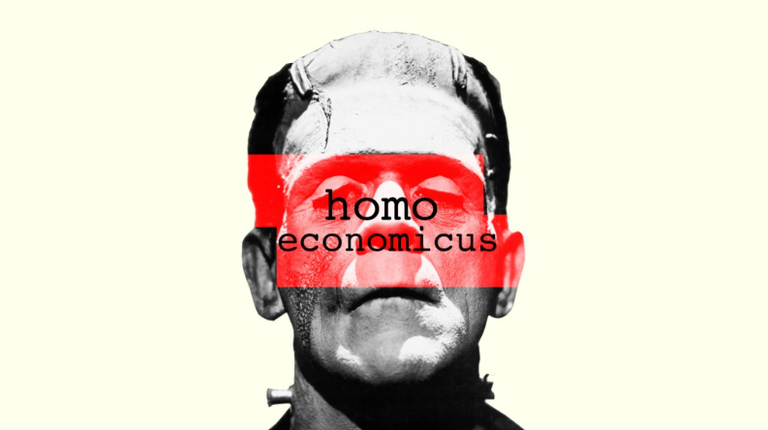This is the first of a series of blogs aiming at debunking some of the most widely spread economic theories that currently shape the world we live in. As a graduated econonomist, I have grown increasingly frustrated in how and what we teach our new upcoming econ students. Newly enrolled econ students are presented a series of theories, models and concepts that are incredibly detached from reality and outdated. These same theories have permeated and trickled down into the world serving a basis for different schools of thought which in turn are the foundation for our current policy makers and economic models we use.
Today we will be taking a look at the homo economicus concept: what it is, where it comes from, it's flaws, how is has impacted economic theory & what could be some alternative models.

What is homo economicus
Lets take a look at the definition of homo economicus:
Homo economicus is a concept in economics that refers to a hypothetical individual who is rational and self-interested, and who makes decisions based on maximizing their own utility or profit.
In short, homo economicus is a human who rationally pursues self-interest without regard for the welfare of other people and is a mere utility maximizing machine. If you ask me, this is a terrifying depiction of the human race. What type of models can be built based on these characteristics of human beings? They have to be inherently inhuman and anti-nature.
Let's take a look at the assumption of rationality and what it entails:
The assumption of rationality of homo economicus means that individuals have a clear understanding of their preferences and the options available to them, and are able to weigh the costs and benefits of different choices. They also have the ability to process and analyze all relevant information, and use this information to make the best possible decision.
So not only are we a maximizing robot, but we are a all-knowing entity that can make split second decisions based on all relevant information surrounding us and know all the possible outcomes. I find it interesting how earlier economists saw us as nothing short of a demi-god figure. I like to compare this concept to a caricature, a "loaded" portrait that intentionally exaggerates a person's prominent features. The concept of "economic man" is not inherently wrong, all these traits exist in a certain degree in us. The caricaturist in this case has chosen to completely draw them out of proportion.
Where does the "homo economicus" concept come from
I am going to give a simplified answer as this concept has been discussed by many economist throughout history. No single individual coined the "economic man" term but it is a concept that evolved during the many centuries. The very first person that drew the first strokes of this caricature of the economic man was no other than Adam Smith in his opus "The wealth of nations" in 1776, albeit his contribution what quite suppercifial defining human beings as animals that like to "trade and barter".
It was not until 1836 that the political economist John Stuart Mill lay out the foundation for the economic man. Mill’s describes human beings as an "economic man with the propensity to make rational decisions". He defined the economic man as one with four distinct interests embedded in pursuit of wealth, including an underlying drive for accumulation, passion for leisure, interest in luxury, and desire for procreation.
The term "homo economicus" comes from a critique to John Stuart's Mill theory by economist Charles Stanton. When talking about Mill's theory, Stanton derided him for:
Dressing up a ridiculous homo economicus ... A "dollar-hunting animal".
The homo economicus term gave the "economic man" a more scientific aura, so in its ever hunger to become more "scientific", economist gladlily accepted the new given nickname. Isn't it funny?
Why is this even being taught at econ courses?
I don't think I have to go much into detail on how flawed this theory actually is. However, it has been widely used. Why? Because we like simple answers to complex questions. This definition has allowed economists to simplify and make predictions about human behavior in a particular economic context. By assuming that individuals are rational and self-interested, economists can model decision-making in a way that is mathematical, which enables them to make predictions about how individuals, firms, and markets will behave in certain situations. Ahhh, the longing for economists to be seen as a "science".
Peace!
Congratulations @arkadik! You received a personal badge!
You can view your badges on your board and compare yourself to others in the Ranking
Check out our last posts: